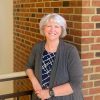This article is more than 5 years old.
I recently attended the Midwest Archives Conference (MAC) annual meeting in Milwaukee, Wisconsin. MAC is one of the largest regional archival organizations, and I have been an involved member since 1995. It was, however, a nasty shock to arrive in Milwaukee with the high only being 40—apparently, I am now completely acclimated to the NC climate.
One of my duties as a Past President of MAC, is to chair the Presidents’ Award Committee, which recognizes individuals, groups, or organizations. This year, the awards were given to the Ability Center of Greater Toledo, and three individuals who founded the Urban Appalachian Council (UAC) in Cincinnati in 1974. After the UAC was closed in 2014, these three made sure 40 years of records were transferred to Berea College for preservation. I had other duties at MAC, including co-teaching a workshop on Career Planning for Archivists and giving a presentation on community beyond the archives, focusing on the St. Benedict 75th anniversary project.
I also was able to attend a number of interesting sessions, but wanted to share more specifically about two that really struck a chord with me:
Crowdsourcing Beyond Transcription:
This pecha kucha style panel presentation offered panelists sharing various stories of how they utilized crowdsourcing in a unique way. The most fascinating was offered by Laura Alagna (Northwestern University) who had received a mobile phone as part of the personal papers of actress Karen Black (one of my favorites, who could ever forget Trilogy of Terror?). It was an old-school mobile phone, and Algana decided to crowdsource donations of charger cords in the hopes of finding the right one to access the contents. Of course, they now have a large collection of charger cords, which they hope to utilize in accessing other obsolete media.
Preparing Students for a Future of Working with the Past: Designing Undergraduate and Graduate TPS Curricula:
This was probably one of the strongest sessions I have ever attended at a MAC meeting. The topics included teaching students about:
Not judging historical resources
Developing an appreciation of changing language
The value of digital hands-on work in research, such as using city directories
There were also presentations on how archives and special collections instruction can focus on engaging your students, as opposed to simply show and tell. The best takeaway? The concept that digital collections are the one thing from Special Collections that students CAN browse.
All in all, attending MAC was well worth shivering in the Milwaukee rain.

3 Comments on ‘Tanya @ MAC (Midwest Archives Conference), Milwaukee, WI’
I looked it up and see that Trilogy of Terror first aired in March of 1975. I remember the next day in high school everyone was talking about this movie.
Sounds like a great conference.
Good!
The topics included teaching students about:
Not judging historical resources
Developing an appreciation of changing language
The value of digital hands-on work in research, such as using city directories
Makes me wish SNCA would merge with some of the other SE regionals to make a create a larger organization.